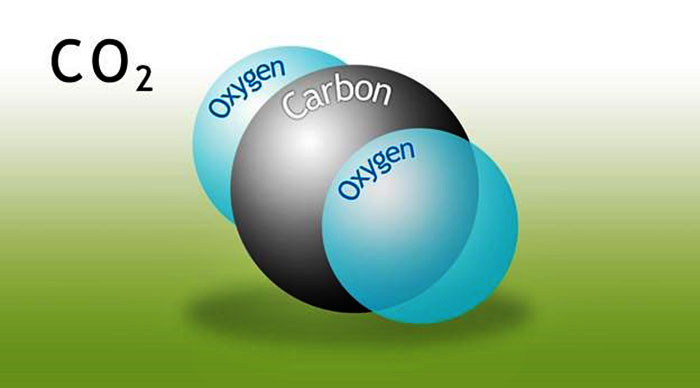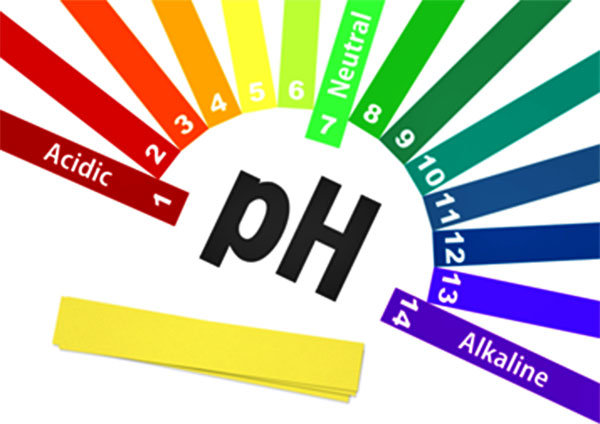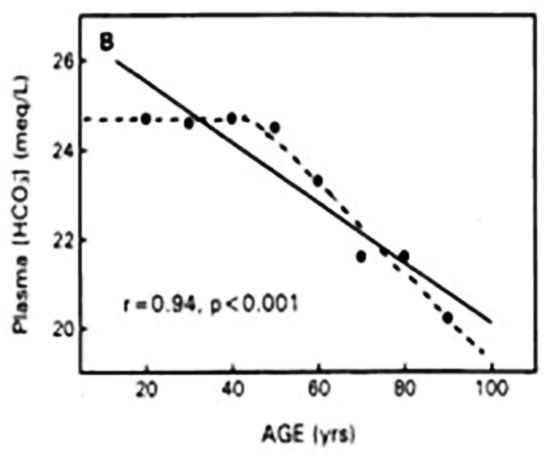|

by Dr. Mark Sircus
July 28, 2025
from
DrSircus Website

Illustration
of a carbon dioxide
(CO2) molecule
consisting of one
carbon atom
bonded to two oxygen
atoms.
Want proof you are alive and healthy?
Just check your
bicarbonate or
CO2 levels,
which is easy to do with pH paper and by checking your breathing
rate.
Life itself, metabolism creates CO2, and the more
you make, the higher your metabolism is, and in terms of health and
exercise, it's the same.
Why is exercise so important and healthy?
When we exercise for cardio health, we are
producing more CO2, which also means we are getting much more
oxygen.
However, the faster you breathe, the more CO2
you blow out, creating deficiencies in the blood.
If you are not producing carbon dioxide, you
are dead.
Without enough carbon dioxide in the air,
we
would all be dead, for there would not be enough food or oxygen in
the air since CO2 is plant food.
Around the year 1900,
the
atmosphere was dangerously low in carbon dioxide, so
now
plants are having a
'party' celebrating the increase of atmospheric
CO2.
Only the demented climatologists,
politicians, and elite-owned media,
make carbon dioxide into a "dangerous gas",
which is one of the most ridiculous claims...
It is essential to understand that,
in the blood,
carbon dioxide and bicarbonates are twin sisters, two forms of the
same thing, and if you want proof of that, squeeze a fresh lemon
into a glass of bicarbonate water and see the bubbles burst out.
The main point of this essay is that
carbon dioxide and bicarbonate deficiencies are the
most unrecognized medical condition on earth, even though it is
extraordinarily common.
Problems revolving around elevated acid pH levels
(relative deficiency in bicarbonate ions) take a significant toll on
human physiology, and the more acidic a person becomes, the larger
the problem for their cell physiology.
Every biochemical reaction is pH sensitive, with
enzymes being especially sensitive.
Our culture places great value on staying and
looking young, and a vast industry is in place to give people
the opportunity to live longer.
Anti-aging enthusiasts contend that life
spans can be prolonged, but they have little idea that
anti-aging begins with the simplest substances, with
bicarbonates, carbon dioxide, and magnesium.
Bicarbonate and
Carbon Dioxide Deficiencies

The administration of
bicarbonates and CO2 can be the most potent
instant-acting medicines.
There is,
-
magnesium bicarbonate super water
-
potassium bicarbonate
-
the well-researched sodium bicarbonate (baking soda),
...on one side,
and the application of pure CO2 gas, which is now
possible with a relatively inexpensive
carbon dioxide inhalation device.
Though
used by doctors for 125 years, and present in most good ICU
units, it is an underused, hidden, sometimes miracle gas because it
controls and makes oxygen safe and
more available to cells.

Bicarbonate deficiencies increase as we age.
Living in toxic cities accelerates declining
bicarbonate levels in the blood and tissues.
Addressing those deficiencies with the three
types of bicarbonates ensures we live a healthier and longer life.
The ability to produce and retain enough carbon dioxide
is as important for longevity as the ability to conserve
enough heat to allow chemical reactions to occur as needed.
Dr. Ray Peat
Dr. Lynda Frassetto of the University of
California, San Francisco, says,
"Insufficient amounts of bicarbonates (CO2)
in our blood reduce our capabilities to manage (neutralize and
dump) the acid our body produces.
This is the cause of aging...!
The age of 45 is the average age when humans
start to show symptoms of diabetes, hypertension, osteoporosis,
and many other adult degenerative diseases.
And since we cannot manage the acid, we
accumulate acidic wastes in our bodies.
These wastes are,
cholesterol, fatty acid,
uric acid, urate, sulfate, phosphate, kidney stones, etc."
The presence of carbon dioxide
is an indicator
of proper
mitochondrial respiratory functioning.
Dr. Frassetto attributes the reduction of
bicarbonates in the blood as we age to generations of modern
American diets.
She also points out in another paper that the
average diet today is high in sodium and low in potassium, contrary
to the human body's original genetic makeup.
Research published recently in the Clinical
Journal of the American Society of Nephrology found that having
balanced bicarbonate levels in your body
reduces the chances of
early death.
The study examined data compiled in the
Health, Aging, and Body Composition Study for 2,287
participants.
Study author Dr. Kalani Raphael, associate
professor and nephrology and hypertension specialist at the
University of Utah, investigated,
-
pH
-
carbon dioxide
-
bicarbonate,
...associated with long-term survival...
According to him,
"Critically ill patients with severe
acid-base abnormalities have a very low likelihood of surviving
their illness."
Dr. Raphael found that low bicarbonate levels are
linked to an increased risk of premature death by 24 percent.
Because bicarbonate deficiencies
become more prevalent as we age,
taking sodium bicarbonate
will help ensure you don't age so fast.
Dr. Parhatsathid Napatalung writes,
"The pancreas is harmed if the body is
metabolically acidic as it tries to maintain bicarbonates.
Without sufficient bicarbonates, the pancreas
is slowly destroyed, insulin becomes a problem, and hence
diabetes becomes an issue.
Without sufficient bicarbonate buffer, the
effect of disease is far-reaching as the body becomes acidic."
Sang Whang says,
"The body's bicarbonate level remains fairly
constant until the age of 45 and linearly decreases about 18% by
the time one reaches 90 years of age.
In general, adult degenerative diseases such
as diabetes and high blood pressure start to appear at the age
of 45 and up, and gradually worsen, approaching the age of 90
and up.
It is this reduction of bicarbonates in the
blood that affects blood flow.
It makes it difficult to manage the
continuous outpouring of acid, making it difficult to eliminate
acid waste from the body and thereby developing many
acid-induced degenerative diseases such as,
-
blood clots
-
acid
reflux
-
heart disease
-
osteoporosis
-
gout
-
diabetes
-
high blood
pressure
-
kidney disease
-
cancer
-
strokes, etc.
Alzheimer's disease is nothing but a slow
acidification of the brain.
All these diseases are caused by
systemic acidosis, which means insufficient bicarbonates in the
blood."
When we become acidic, the body steals minerals
such as sodium, potassium, magnesium, and calcium from the bones and
organs to neutralize the acid.
This puts stress on the body and, unfortunately,
can go unnoticed for many years, especially because doctors
prescribe further acid-forming drugs to cover up the symptoms of
acidity.
British scientists
at the Royal London Hospital
show that sodium bicarbonate
can dramatically
slow the progress of
chronic kidney disease.
Sodium bicarbonate is the best, quickest, and
safest way of assisting your body in balancing pH levels, thereby
extending life by reducing the formation of serious diseases.
It is
also one of the best medicines (foods) for
treating cancer.
Dr. Alina Vasiljeva and Dr. David Nias
wrote,
"At the end of the 19th century,
scientists Bohr and Verigo discovered what seemed a strange law:
a decreased level of carbon dioxide in the blood leads to
decreased oxygen supply to the cells in the body, including the
brain, heart, kidneys, etc.
Carbon dioxide (CO2) was found to
be responsible for
the bond
between oxygen and hemoglobin.
If the level of carbon dioxide in the blood
is lower than normal, then this leads to difficulties in
releasing oxygen from hemoglobin.
Hence the
Verigo-Bohr law."
Under clinical conditions, low oxygen and low
carbon dioxide generally occur together.
Therapeutic increase of carbon dioxide, by
inhalation of this gas diluted in air, is often an effective
means of improving the oxygenation of the blood and tissues.
Taking bicarbonate orally and in
baths increases CO2 levels (bicarbonate) in the blood, as does
slow
breathing.
Recommended ways to increase our bicarbonate
levels as we age:
-
Add... 1/4 tsp sodium bicarbonate to each
gallon of drinking water
-
Drink
MagBicarb water in place of usual drinking water... up
to 8 glasses per day
-
Taking 2-4 daily doses
of Bicarb Formula each day
Anti-aging medicine is not limited to adding
years to one's life somewhere in the future.
We employ anti-aging medical technology to add
more vitality to one's years right now.
The real goal is to feel as good as possible in
the present and to maintain as much of that energy, vitality, and
functional ability as possible throughout the entire aging process.
|




